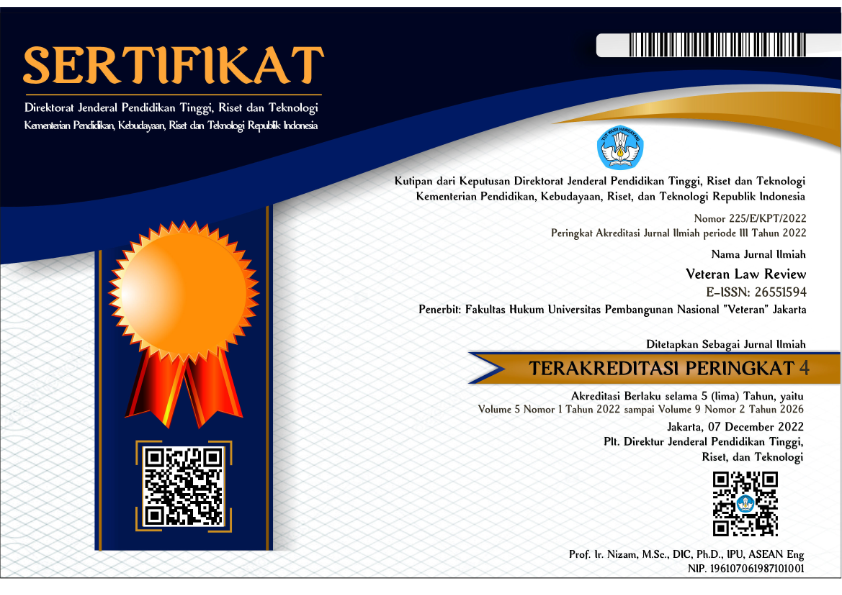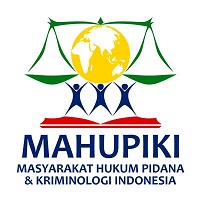The Relationship Between Adat Law & National Law on Marriage in Indonesia
DOI:
https://doi.org/10.35586/velrev.v6i2.6553Keywords:
national marriage law, customary law, marriageAbstract
Indonesia is an archipelagic country that has a pluralistic society consisting of diverse ethnicities, customs and cultures. Each group lives by using rules nor established good norms written or unwritten and originating from habit Indonesian society or the customs in which it is used to regulate life behavior _ society , which is often referred to as "customary" or "customary law". As a country in the form of a republic , Indonesia is regulated by law in statutory regulations , where these statutory regulations are written laws. To carry out a marriage, for a country and nation like Indonesia it is It is absolute that there is a National Marriage Law that also accommodates principles and provide a legal basis for marriage which has been the guideline and has been applied to various groups in society us . But marriage in Indonesia can also be carried out with the customary law of certain indigenous communities in accordance with the rules or norms that bind them hereditary.
Downloads
References
Journal Articles:
Santoso (2016). The Nature of Marriage According to the Marriage Law, Islamic Law and Customary Law. Judisia Journal Vol. 7(2) December 2016.
Hadi, Syofyan (2017). Positive Law and The Living Law (Existence and Application in Society). DiH Journal Legal Science Vol. 13 (26) August 2017. 259-266.
Books with an author:
Aprilianti and Kasmawati (2022). Customary Law in Indonesia. Media Library. Bandar Lampung.
Hilman Hadikusuma (1990). Indonesian Marriage Law. Mandar Maju, Bandung.
Hilman Hadikusuma (2003). Introduction Indonesian Customary Law Science. Mandar Maju. Bandung.
Hilman Hadikusuma (2007). Indonesian Marriage Law (According to: Legislation, Customary Law, Religious Law). Masdar Maju. Bandung.
Imam Sudiyat (1981). Principles of Bekal Customary Law Introduction. Liberty. Yogyakarta.
Imam Sudiyat (1981). Basic Sketch of Customary Law. Liberty. Yogyakarta.
Soekanto, Soerjono (2020). Indonesian Customary Law. Rajawali Press. Depok.
Peraturan Perundang-Undangan:
Undang-Undang Dasar Tahun 1945.
Kitab Undang-Undang Hukum Perdata.
Undang-Undang Nomor 1 Tahun 1974 tentang Perkawinan. Lembaran Negara Republik Indonesia Tahun 1974 Nomor 1, Tambahan Lembaran Negara Republik Indonesia Nomor 3019.
Undang-Undang Nomor 23 Tahun 2006 tentang Administrasi Kependudukan. Lembaran Negara Republik Indonesia Tahun 2016 Nomor 124, Tambahan Lembaran Negara Republik Indonesia Nomor 4674
Undang-Undang Nomor 32 Tahun 2009 tentang Perlindungan dan Pengelolaan Lingkungan Hidup, Lembaran Negara Republik Indonesia Tahun 2009 Nomor 140, Tambahan Lembaran Negara Republik Indonesia Nomor 5059.
Undang-Undang Nomor 5 Tahun 2017 tentang Pemajuan Kebudayaan, Lembaran Negara Republik Indonesia Tahun 2017 Nomor 104, Tambahan Lembaran Negara Republik Indonesia Nomor 6055.
Website Material:
Umam. Understanding Customs According to Experts, Types and Examples. Retrieved September 23, 2023, from https://www.gramedia.com/literasi/pengertian-adat/
Dinas Kependudukan dan Catatan Sipil Kabupaten Badung. Definition of Civil Registry. Retrieved September 25, 2023, from https://disdukcapil.badungkab.go.id/article/17825-pengertian-dataan-sipil .
Dinas Kependudukan dan Catatan Sipil Yogyakarta. History of Civil Registry. Retrieved September 25, 2023, from https://dindukcapil.jogjakota.go.id/page/index/wisata
Downloads
Published
How to Cite
Issue
Section
License
Copyright (c) 2023 Veteran Law Review

This work is licensed under a Creative Commons Attribution-ShareAlike 4.0 International License.
Copyright (c) 2022 Veteran Law Review Journal
Veteran Law Review © 2022 by Faculty of Law Universitas Pembangunan Nasional "Veteran" Jakarta is licensed under Creative Commons Attribution 4.0 International

1. License
The non-commercial use of the article will be governed by the Creative Commons Attribution license as currently displayed on Creative Commons Attribution 4.0 International.
2. Author(s)' Warranties
The author warrants that the article is original, written by the stated author(s), has not been published before, contains no unlawful statements, does not infringe the rights of others, is subject to copyright that is vested exclusively in the author, and free of any third party rights, and that any necessary written permissions to quote from other sources have been obtained by the author(s).
3. User/Public Rights
VELREV's spirit is to disseminate articles published are as free as possible. Under the Creative Commons Attribution-ShareAlike 4.0 International License. VELREV permits users to copy, distribute, display, and perform the work for non-commercial purposes only. Users will also need to attribute authors and VELREV to distributing works in the journal and other media of publications.
4. Rights of Authors
Authors retain all their rights to the published works, such as (but not limited to) the following rights;
- Reproduce the work
- Prepare derivative works based upon the work
- Distribute copies of the work
- Perform the work publicly
- Display the work publicly
- Copyright and other proprietary rights relating to the article, such as patent rights,
- The right to self-archive the article,
- The right to enter into separate, additional contractual arrangements for the non-exclusive distribution of the article's published version (e.g., post it to an institutional repository or publish it in a book), with an acknowledgement of its initial publication in this journal (Veteran Law Review).
5. Co-Authorship
If the article was jointly prepared by more than one author, any author submitting the manuscript warrants that he/she has been authorized by all co-authors to be agreed on this copyright and license notice (agreement) on their behalf, and agrees to inform his/her co-authors of the terms of this policy. VELREV will not be held liable for anything that may arise due to the author's internal dispute. VELREV will only communicate with the corresponding author.
6. Royalties
Being an open accessed journal and disseminating articles for free under the Creative Commons license term mentioned, author(s) are aware that VELREV entitles the author(s) to no royalties or other fees.
7. Miscellaneous
VELREV will publish the article (or have it published) in the journal if the article’s editorial process is successfully completed. JOSI's editors may modify the article to a style of punctuation, spelling, capitalization, referencing, and usage that deems appropriate. The author acknowledges that the article may be published so that it will be publicly accessible and such access will be free of charge for the readers as mentioned in point 3.

















